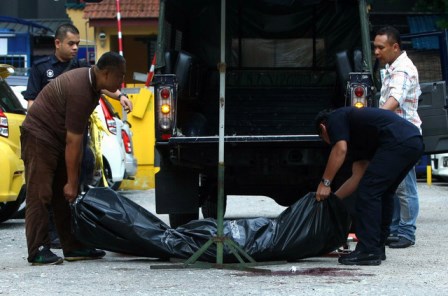
A spate of killings may signal an escalation of gang violence
When K. Veerappan stopped his car at a traffic light in Georgetown, the old centre of Penang, it was the opportunity his killer had been waiting for. He came up alongside on August 8th and pumped at least ten bullets into Mr Veerappan, killing him instantly.
The murder has shocked Malaysians. It was brazen—happening in broad daylight in the middle of one of the country’s main tourist spots. And it was only one of a trio of Penang shootings. On the same day that Mr Veerappan was killed, a house was sprayed with bullets, though no one was hurt. The following day a nightclub bouncer was shot, though he survived. [Source: The Economist]
Comment:
The past few months have shown a worrying increase in crime rate in Malaysia, especially crimes involving fatal shootings. Malaysia already has its share of frequent criminal acts such as burglary, bag-snatching and other petty crimes but lately, almost daily shootings in a country where illegal weapons possession may bring about death sentence is certainly sowing much fear and uneasiness amongst the population. Dozens of shootings had been reported within the past two months but the reason behind them still remains unclear. In the latest shooting spree, on the 24th of August 2013, two gunmen sprayed ‘random’ shots on six men at a restaurant in the northern state of Penang and the reason behind the shooting still remains a mystery. It was thought that behind the increase in the rate of crimes involving fatal shootings, a battle is ensuing amongst thousands of gang lords who had been released since 2011 when the current government was pressured to abolish a law which allowed preventive detention. However, many dismissed this attempt to explain the worrying phenomena as a smokescreen to hide police ineptitude.
This unsettling and distressing trend has certainly put a strong pressure on the police force, which for years have faced various accusations of incompetence, corruption and bias, to buckle up and ‘restore public confidence’. In the wake of this disturbing phenomenon, the distressed public has been increasingly involved in ‘vigilantism’ where there is a noticeable escalation in community patrols and barricading of neighbourhoods. In response to criticisms on government handling of crime, Prime Minister Najib, whose government had prompted skepticism by claiming that crime has reduced since 2011, made no mention of police or legal reforms. He instead promised strong new anti-crime measures that will respect ‘civil liberties’.
It is very unfortunate that when pressing issues of human problems such as crime are discussed, we never had the pleasure of experiencing real, effective solutions to these problems. As Muslims, our society had been immunized, with the effort of the West, from Islam and to reject the return of the rule of Islam in our lives. Consequently, the true solutions provided by Islam, the Shariah, in solving human problems, are cast aside and even worse, demonised to the extent that even Muslims don’t view Islamic solutions as viable and relevant. What needs to be stressed here is that Shariah is not just a set of harsh punishments but a complete value based system that can address diverse problems such as crime, poverty, education and healthcare and many other societal issues and challenges. The Shariah is a complete system of life which emanates from the Islamic Aqeedah and consists of three main bases; values, rules and punishment. All three elements combine to bring peace and stability in society and so cannot be separated or depicted as merely a set of punishments. Crime is rampant not due to some superficial reason but it is mainly due to freedom and the values of individualism and materialism that it spawns. As such, in solving crime, a total implementation of Islam will instill elements of fear of God, purity of morals (akhlaq), collective responsibility, protection of the sanctity of life, property and dignity and the implementation of a set of harsh punishments for perpetrators. The philosophy, on which the Islamic penal system is based, is to protect the society as a whole, which consequently protects the individual via harsh deterring punishments with a high evidential burden and due process to prevent the miscarriage of justice. Punishments are deliberately harsh to prevent crime and send a message out to society that the values of life, property and chastity are sacrosanct.
It is indeed quite difficult to imagine how the government of Malaysia and its police force could stop the shootings and other crimes which are rampant in this country under the current secular and capitalistic regime. Under such regime, we may see problems being partially solved only to re-appear in more virulent forms. It is thus very important for Muslims all over, especially in Malaysia to understand and to return to the completeness and truth of the Islamic solutions and work to implement them in a holistic manner. Under the complete implementation of the Shariah, crimes involving fatal shootings are not the only problems that will be solved. All societal ills will be duly untangled under the umbrella of the Shariah and Khilafah.
Dr. Muhammad
Malaysia
